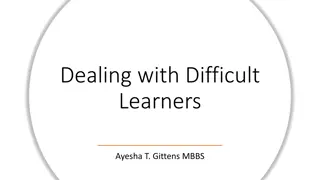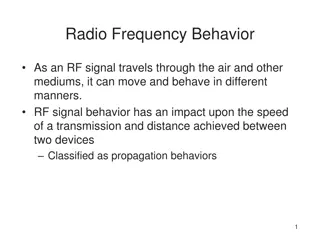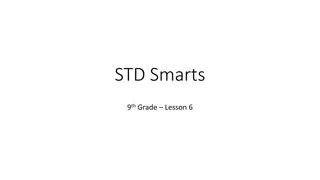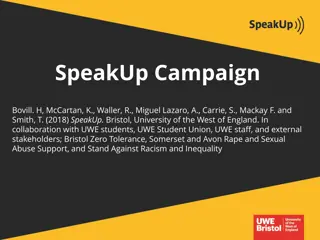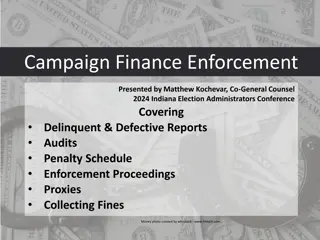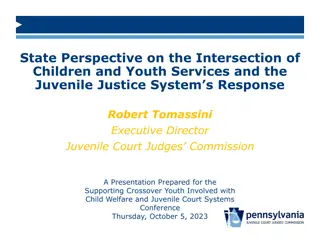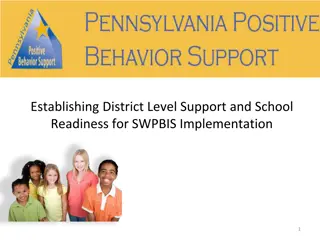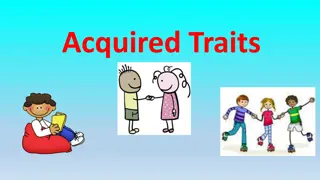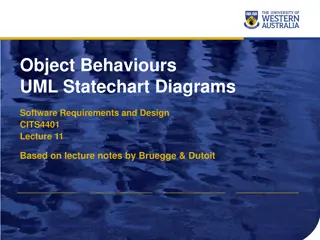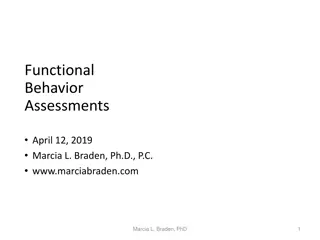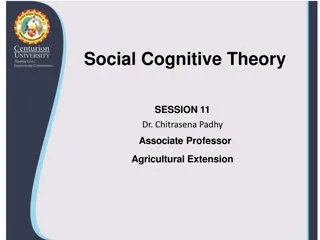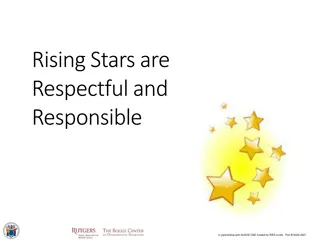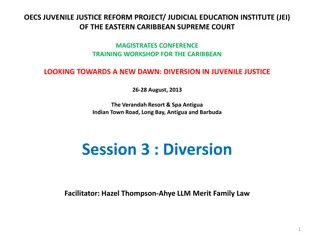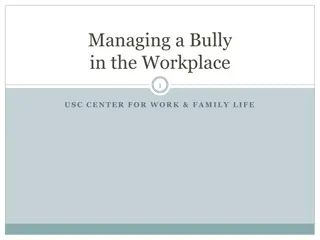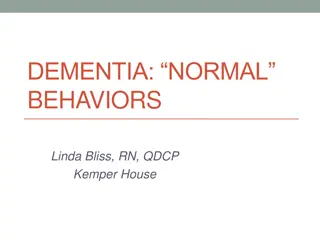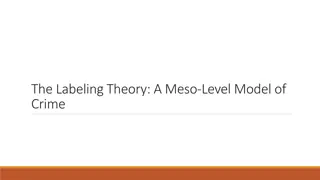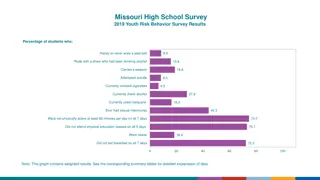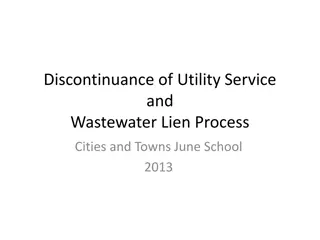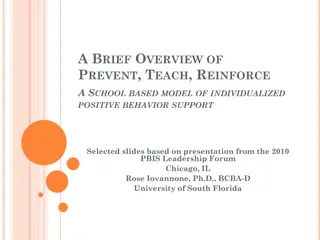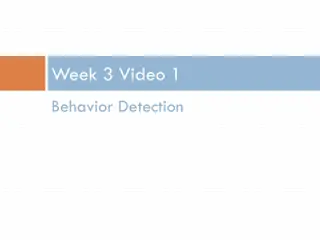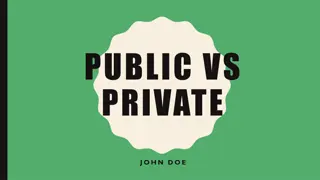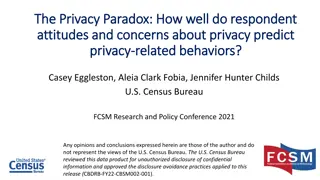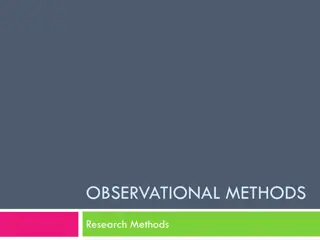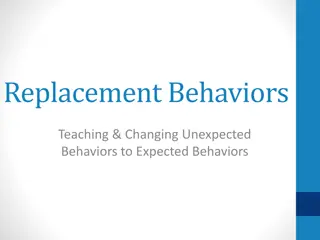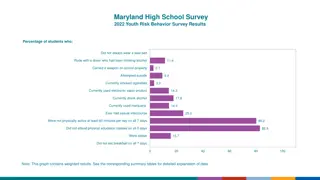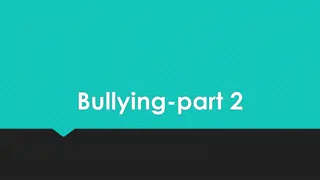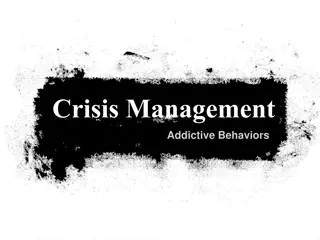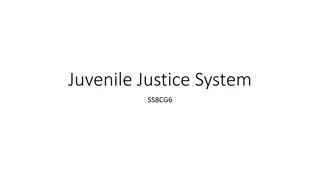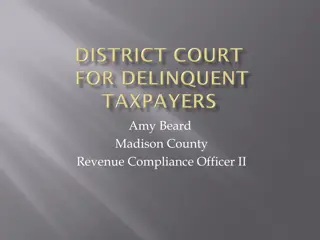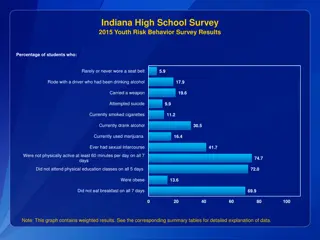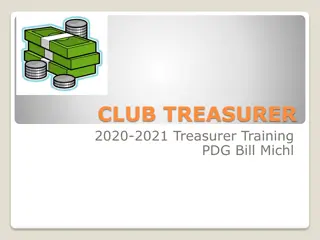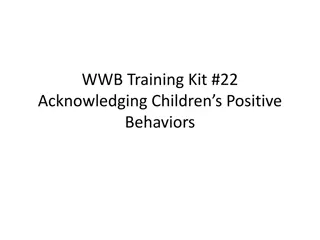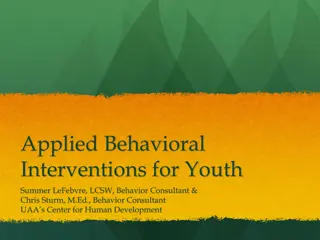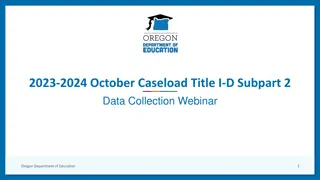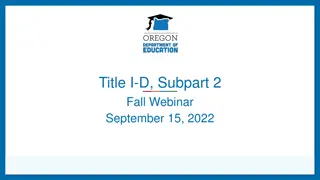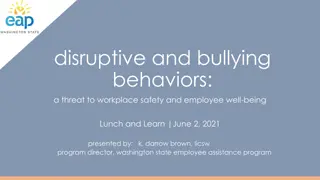Understanding and Managing Difficult Learner Behaviors in Adult Education
Dealing with difficult learners in adult education settings can impact the learning experience for all. This guide covers types of challenging behaviors, identifying underlying causes, and strategies for maintaining a constructive educational environment. By addressing disruptive behaviors effective
1 views • 32 slides
Understanding Changes in Domestic Abuse Practices Over the Last 2 Years
In the realm of domestic abuse and coercive control, there have been notable developments in practice over the past two years. From defining behaviors that constitute domestic abuse to recognizing economic abuse and the impact of coercive and controlling behaviors, the legal landscape has evolved to
6 views • 30 slides
Understanding Radio Frequency Behavior and Propagation Behaviors
Radio frequency signals exhibit various behaviors as they travel through different mediums, affecting transmission speed and distance between devices. Propagation behaviors include absorption, reflection, scattering, refraction, and diffraction, impacting wireless network performance. Understanding
1 views • 32 slides
STD Smarts 9th Grade Lesson: Risky Behaviors and STD Testing
In this 9th grade lesson on STD Smarts, students explore risky behaviors related to STD transmission and delve into the importance of STD testing. The lesson covers various scenarios and myths surrounding STDs, challenging students to consider their choices and knowledge about sexual health. Through
0 views • 32 slides
Understanding Sexual Violence and Harassment in Educational Settings
Sexual violence and harassment, including rape, sexual assault, and unwanted sexual behaviors, are serious issues that can affect anyone. This content highlights what sexual violence is, who can experience it, and the impact it has on students in educational environments. It also covers sexual haras
1 views • 27 slides
Campaign Finance Enforcement
Explore the detailed process of handling delinquent and defective campaign finance reports, audits, enforcement proceedings, and penalties as presented at the Indiana Election Administrators Conference. Learn about the actions required for late reports, defective filings, and the steps involved in e
0 views • 19 slides
Juvenile Court Judges Commission: Enhancing Pennsylvania's Juvenile Justice System
The Juvenile Court Judges Commission in Pennsylvania, comprising nine judges appointed by the Governor, plays a crucial role in providing leadership, advice, and support to improve the state's juvenile justice system. Their mission is focused on community protection, offender accountability, victim
3 views • 18 slides
SWPBIS Implementation: Establishing District Support and School Readiness
Positive Behavioral Interventions and Supports (PBIS) focuses on creating effective environments to encourage appropriate behaviors. SWPBIS extends this approach to whole schools, applying systemic strategies to achieve positive outcomes and prevent problem behaviors. It is not a quick fix or just a
2 views • 18 slides
Understanding Multiple Baseline Designs in Behavioral Experiments
Multiple Baseline Designs are a type of experimental design used in behavioral research. This design involves measuring two or more behaviors concurrently in a baseline condition, applying a treatment variable to one behavior at a time while maintaining baseline conditions for others, and then seque
0 views • 34 slides
Managing Difficult Employees and Disruptive Behaviors
Identify common types of difficult and disruptive employee behaviors, discuss the potential impact on the organization, and offer tips for constructive management in the workplace. Explore behaviors like gossiping, incivility, bullying, insubordination, and arrogance. Understand the metrics and lega
1 views • 20 slides
Understanding Acquired Traits and Learned Behaviors in Living Organisms
Acquired traits are physical characteristics acquired during a living thing's lifetime, such as scars, and are not passed down from parents. Many acquired traits are also learned behaviors, like reading or flying, which animals develop after birth. Learned behaviors, unlike inherited instincts, are
4 views • 15 slides
Understanding Object Behaviors and Statechart Diagrams in Software Design
Object behaviors and UML statechart diagrams play a crucial role in software requirements and design. State machines, transitions, events, and states are essential concepts in modeling object behavior in response to external events. By utilizing UML statechart diagrams, one can effectively represent
0 views • 23 slides
Understanding Functional Behavior Assessments for Supporting Students
Functional Behavior Assessments (FBAs) play a crucial role in supporting students with behavioral needs by identifying the reasons behind inappropriate behaviors. This approach, led by professionals like Marcia L. Braden, Ph.D., helps define interventions, prevent problems, and teach alternative beh
1 views • 51 slides
Understanding Social Cognitive Theory: Insights from Albert Bandura
Social Cognitive Theory, developed by Albert Bandura, emphasizes learning through observation and modeling behaviors. The theory explores how individuals acquire new behaviors, thoughts, and attitudes by observing others. Bandura's famous Bobo doll experiment showcased how children imitated aggressi
6 views • 17 slides
Encouraging Responsible Behaviors in Students - Partnership with NJDOE
Promote responsible behaviors among students with engaging activities and worksheets funded by IDEA funds in collaboration with NJDOE. Students learn to arrive on time, keep track of materials, admit to mistakes, and more, fostering a culture of responsibility and accountability. Explore examples, i
1 views • 26 slides
Juvenile Justice Diversion Programs: Principles and Importance
Explore the concept of diversion in juvenile justice, which involves redirecting young offenders away from formal legal proceedings towards community support. Learn about the guiding principles, importance, and various diversion programs at regional and international levels. Understand how diversion
0 views • 15 slides
Dealing with Workplace Bullies: A Comprehensive Guide
Workplace bullying is driven by power dynamics and can manifest through various behaviors such as sabotage, insults, and humiliation. Understanding the motivations and behaviors of bullies is crucial in recognizing and effectively managing their actions in the workplace. This guide delves into ident
1 views • 17 slides
Understanding Normal Behaviors in Dementia Care
Dementia presents a range of normal behaviors that can be challenging for caregivers. By learning to identify triggers, interpret communication, and respond effectively, caregivers can provide better support for individuals with dementia. This session explores common behaviors like aggression, wande
0 views • 29 slides
Understanding the Labeling Theory in Criminology
The Labeling Theory explores how individuals, particularly juveniles, are labeled by society and authorities, leading to self-fulfilling prophecies of delinquent behavior. It discusses the impact of societal perceptions on criminal identity, highlighting the consequences of being labeled as "bad kid
0 views • 9 slides
Missouri High School Survey 2019 Youth Risk Behavior Results
This survey presents key percentages and numbers of high school students in Missouri regarding risky behaviors such as seat belt usage, alcohol and drug consumption, physical activity, and more. It outlines the prevalence of behaviors like not wearing a seat belt, riding with a driver under the infl
0 views • 4 slides
Discontinuance of Utility Service and Wastewater Lien Process in Cities and Towns (June School 2013)
The process of discontinuing utility services, particularly water and wastewater services, due to nonpayment of charges is outlined in statutes such as IC 8-1.5-3-4 and IC 36-9-23-6. The statutes provide guidelines for discontinuing water service to consumers or properties after a specified period o
0 views • 20 slides
School-Based Model of Individualized Positive Behavior Support
A brief overview of the Prevent-Teach-Reinforce (PTR) model presented at the 2010 PBIS Leadership Forum in Chicago, highlighting the 5-step Tier 3 support model, critical components of behavior support, team evaluation, goal setting, and operational definitions of behaviors and replacements. The mod
0 views • 24 slides
Understanding Behavior Detection Models in Educational Settings
Explore how behavior detectors automatically infer student behaviors from interaction logs, such as disengaged behaviors like Gaming the System and Off-Task Behavior, as well as Self-Regulated Learning (SRL) behaviors like Help Avoidance and Persistence. Discover the goal of identifying these behavi
0 views • 18 slides
Understanding Public and Private Spaces and Behaviors
Exploring the concept of public versus private spaces, behaviors, and activities through examples such as public places like restaurants and schools, as well as private places like bedrooms and medical offices. The content also delves into public behaviors like shaking hands and talking to people, c
0 views • 7 slides
Understanding the Privacy Paradox: Attitudes vs. Behaviors
Social scientists have identified a Privacy Paradox where individuals with strong privacy concerns may not always engage in behaviors that protect their privacy. While some studies show a discrepancy between attitudes and behaviors, others suggest that privacy-concerned individuals do employ privacy
0 views • 14 slides
Understanding Observational Research Methods
Observational research methods involve systematic observation of behaviors and can be used in various study designs such as experimental, correlational, and descriptive research. This type of research aims to provide insights into real-world behaviors with a focus on ecological validity. The process
0 views • 14 slides
Understanding Replacement Behaviors in Behavioral Interventions
Dive into the concept of replacement behaviors in behavior modification strategies. Learn how to identify, teach, and implement expected behaviors to replace unwanted actions. Discover the role of the Child Study Team in developing action plans, prioritizing behaviors, and evaluating progress. Explo
0 views • 30 slides
Maryland High School Survey 2022 Youth Risk Behavior Results
The Maryland High School Survey 2022 Youth Risk Behavior Results provide insights into students' behaviors. Key findings include percentages and numbers of students who engage in risky behaviors such as not wearing seat belts, riding with drivers who drink alcohol, carrying weapons, attempting suici
0 views • 4 slides
Understanding Bullying Behaviors and Impact: Review and Reflection
Explore the concepts of respectful and disrespectful behaviors, bullying characteristics, who is more likely to be bullied, reasons behind bullying, and the lasting impact of bullying through a review and reflection session. Delve into Mr. Palm's story to understand the profound impact of bullying b
0 views • 23 slides
Understanding and Managing Addictive Behaviors
Exploring the roots and realities of addiction, this content delves into the traps that individuals, especially teenagers, can fall into. From crisis management to the impact of addictive behaviors on mental and physical health, the content sheds light on the dangers and consequences of various addi
0 views • 15 slides
Overview of State Debts and the Treasury Offset Program (TOP)
Explore the role of Debt Management Services (DMS) in assisting states with debt collection, including child support obligations and income tax debts. Learn about the Treasury Offset Program (TOP) that intercepts federal and state payments to payees with delinquent debts. Discover how states can add
0 views • 13 slides
Understanding the Juvenile Justice System
Dive into the complexities of the juvenile justice system, exploring topics such as peaceful solutions, juvenile rights compared to adults, delinquent and unruly behaviors, probable cause for custody, and the detailed steps in the juvenile justice process from intake to appeal.
0 views • 35 slides
Madison County Revenue Compliance Procedures
The procedures followed by Amy Beard, a Revenue Compliance Officer II in Madison County, towards delinquent taxpayers include contacting, sending certified letters, filing warrants, and conducting hearings and trials. Repeat attempts are made to contact taxpayers and ensure compliance. Failure to co
0 views • 11 slides
Indiana High School Survey 2015 Youth Risk Behavior Results
The Indiana High School Survey 2015 provides valuable insights into the risk behaviors of high school students in Indiana. The survey results reveal concerning percentages of students who engage in behaviors such as not wearing seat belts, riding with drivers who have consumed alcohol, carrying weap
0 views • 4 slides
Club Treasurer 2020-2021 Duties and Responsibilities
The Club Treasurer for 2020-2021 has specific responsibilities including receiving and depositing monies, paying club obligations approved by the board of directors, keeping financial records, and maintaining general records of club receipts and disbursements. It is important for the treasurer to in
0 views • 12 slides
Understanding Positive Behavior Acknowledgment in Children
Acknowledging children's positive behaviors is crucial for reinforcing desired behavior patterns. Positive responses help in promoting positive interactions, following instructions, proper communication, and independent self-care skills. It is important to recognize and praise positive behaviors to
0 views • 11 slides
Understanding Applied Behavior Analysis (ABA) for Youth Interventions
Applied Behavior Analysis (ABA) is a science focusing on improving human behavior by increasing desired behaviors, teaching new skills, and generalizing behaviors. ABA emphasizes observable behaviors, measurement of behavior change, and the use of interventions in various settings like classrooms an
0 views • 25 slides
October Caseload Data Collection Webinar by Oregon Department of Education
Oregon Department of Education is hosting a webinar on the October Caseload Data Collection, which determines funding allocations for districts with Neglected and Delinquent Facilities. This collection window opens on October 26 and closes on December 1, 2023. The webinar covers important topics suc
0 views • 31 slides
Title I-D, Subpart 2 Fall Webinar Overview
The Title I-D, Subpart 2 Fall Webinar held on September 15, 2022, discussed the purpose of improving educational services for neglected or delinquent students, eligibility criteria for receiving funds, requirements for preparing students for post-school opportunities, and the importance of accurate
0 views • 13 slides
Workplace Safety and Well-being Lunch and Learn Event Overview
This Lunch and Learn event held on June 2, 2021, addressed disruptive and bullying behaviors as threats to workplace safety and employee well-being. Key topics included identifying, addressing, and discussing such behaviors, along with statistics on civility in the workplace and challenges faced due
0 views • 26 slides
